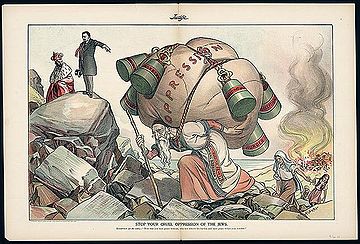- Oppression
-
"Oppressed" redirects here. For the Welsh band, see The Oppressed. For other uses, see Oppression (disambiguation).
Oppression is the exercise of authority or power in a burdensome, cruel, or unjust manner.[1] It can also be defined as an act or instance of oppressing, the state of being oppressed, and the feeling of being heavily burdened, mentally or physically, by troubles, adverse conditions, and anxiety.
Oppression is a popular topic in debates, such as in the QDU league in secondary schools.[citation needed]
Contents
Social oppression
The systematic; socially supported mistreatment and exploitation of a group or category of people by anyone.
Institutionalized oppression
"Institutional Oppression occurs when established laws, customs, and practices systematically reflect and produce inequities based on one’s membership in targeted social identity groups. If oppressive consequences accrue to institutional laws, customs, or practices, the institution is oppressive whether or not the individuals maintaining those practices have oppressive intentions." [2]
Systematic oppression
Anarchists and other libertarian socialists argue that police and law themselves are oppression. The term oppression in such instances to refer to the subordination of a given group or social category by unjust use of force, authority, or societal norms in order to achieve the effects noted above. When institutionalized, formally or informally, it may achieve the dimension of systematic oppression. Oppression is customarily experienced as a consequence of, and expressed in, the form of a prevailing, if unconscious, assumption that the given target is in some way inferior. Oppression is rarely limited solely to formal government action: an individual may be the particular focus of oppression or persecution and in such circumstances have no group membership in which to share, and thus maybe mitigate, the burden of ostracism.
In psychology, racism, sexism and other prejudices are often studied as individual beliefs which, although not necessarily oppressive in themselves, can lead to oppression if they are codified in law or become parts of a culture. By comparison, in sociology, these prejudices are often studied as being institutionalized systems of oppression in some societies. In sociology, the tools of oppression include a progression of denigration, dehumanization, and demonization; which often generate scapegoating, which is used to justify aggression against targeted groups and individuals.
The Universal Declaration of Human Rights and the concept of "human rights" in general were designed to limit oppression by giving a clear articulation of what fundamental freedoms any system should allow to all of the people over whom it has power.
When oppression is systematized through coercion, threats of violence, or violence by government agencies or non-government paramilitiaries with a political motive, it is often called Political repression. More subtle forms of political oppression/repression can be produced by blacklisting or individualized investigations such as happened during McCarthyism in the United States.
Transnational systems of oppression include colonialism, imperialism, and totalitarianism, and can generate a resistance movement to challenge the oppressive status quo.
Internalized oppression
In sociology and psychology, internalized oppression is the manner in which an oppressed group comes to use against itself the methods of the oppressor. For example, sometimes members of marginalized groups hold an oppressive view toward their own group, or start to believe in negative
Indirect oppression
Indirect oppression is oppression that is effected by psychological attack, situational constraints or other indirect means. It has been a popular tactic practiced in single power[clarification needed], power monopoly or other authoritarian or totalitarian regimes.
Resistance
Several movements have arisen that specifically aim to oppose, analyse and counter oppression in general; examples include Liberation Theology in the Christian world, and Re-evaluation Counselling in the psychotherapeutic arena. Modern-day groups that actively oppose oppression include Ligali, a British African organization headed by civil rights activist Toyin Agbetu.
See also
- Oppressors-oppressed distinction
- Anti-oppressive practice
- Authoritarianism
- Civil rights movement
- Ethnic cleansing
- Terrible Triangle
- Feminist movement
- Intersectionality
- Political repression
- Police oppression
- Totalitarianism
- Poverty
References
Further reading
- Guillaumin, Colette. 1995. Racism, Sexism, Power and Ideology. London: Routledge.
- Hobgood, Mary Elizabeth. 2000. Dismantling Privilege: An Ethics of Accountability. Cleveland, OH: Pilgrim Press.
- Young-Bruehl, Elisabeth. 1996. The Anatomy of Prejudices. Cambridge, MA: Harvard University Press.
- Noël, Lise. 1994. Intolerance, A General Survey. Montreal: McGill-Queen’s University Press.bany, NY: State University of New York Press.
- Smith, Morgan. 2008. Why I stick it to the man, and why you should too. New York: HarperCollins Publishers
- Omi, Michael and Howard Winant. 1994. Racial Formation in the United States: From the 1960s to the 1990s. New York: Routledge.
- Feagin, Joe R. and Hernan Vera. 1995. White Racism: The Basics. New York: Routledge.
- Pincus, Fred L. 1999 and Howard J. Ehrlich, eds. 1999. Race and Ethnic Conflict: Contending Views on Prejudice, Discrimination, and Ethnoviolence. Boulder, Colo.: Westview.
- Beck, Aaron, M.D. 1999 Prisoners Of Hate. New York: HarperCollins Publishers
- Solzhenitsyn, Alexandr, "The Gulag Archipelago," Harper and Row, 1973
- Kiernan, Ben, "The Pol Pot Regime: Race, Power, and Genocide in Cambodia under the Khmer Rouge, 1975-79," Yale University Press, 1996
- Cudd, Ann E. 2006. Analyzing Oppression. Oxford: Oxford University Press.
- Deutsch, Morton. 2006. A Framework for Thinking about Oppression and Its Change. "Social Justice Research", Vol. 19, No.1, March 2006, pp. 7–41.
Abuse Types Anti-social behaviour · Bullying · Child abuse (neglect, sexual) · Domestic abuse · Elder abuse · Harassment · Humiliation · Incivility · Institutional abuse · Intimidation · Neglect · Personal abuse · Professional abuse · Psychological abuse · Physical abuse · Sexual abuse · Spiritual abuse · Stalking · Structural abuse · Verbal abuse · more...
Related topics Complex post-traumatic stress disorder · Dehumanization · Denial · Destabilisation · Exaggeration · Grooming (adult, child) · Lying · Manipulation · Minimisation · Personality disorders · Psychological projection · Psychological trauma · Psychopathy · Rationalization · Victim blaming · Victim playing · Victimisation
Categories:- Neuroethology
- Metaphysics
- Sociology
- Causality
- Negative Psychology
Wikimedia Foundation. 2010.

